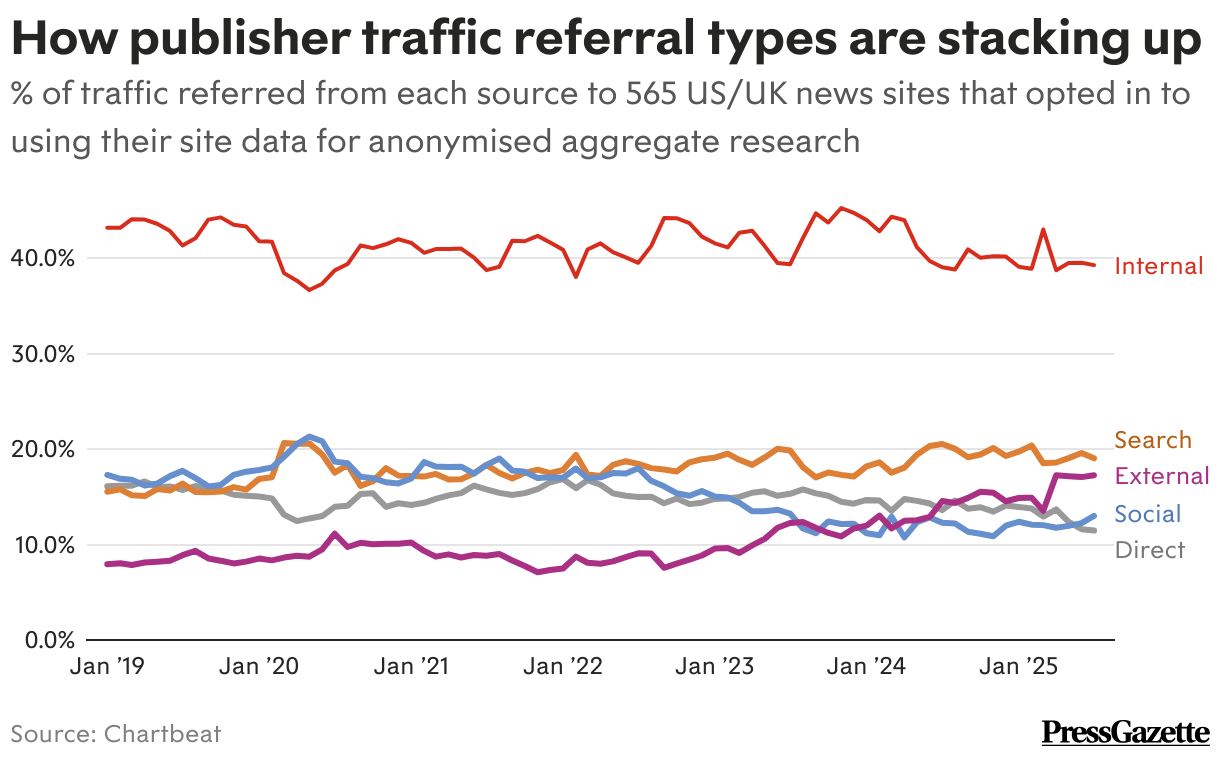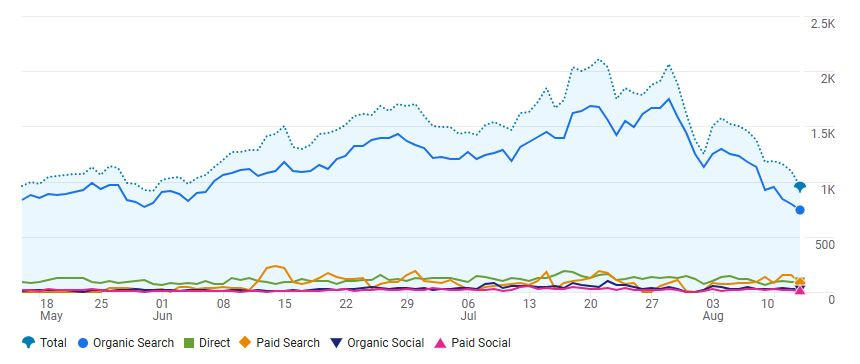GPT5 Makes SEO Irreplicable, Google Traffic 'Stable' Despite AI Mode & More
SEO TL;DR #81 19/08/2025
GEO/AIO/SEO (and all those other acronyms)
Traffic From Google May Not Be Falling Becasue of AI
New Chartbeat data shows that search as a traffic source is holding up for publishers, despite several studies saying that AI Overviews and AI Mode are leading to less traffic. This is the first data I’ve seen which backs up Google’s statement that traffic is thriving.
The graph below shows that Google referrals are steady, largely thanks to Discover, which now accounts for more traffic than traditional search.
Direct traffic to news sites is down from 16% in 2022 to under 12% this summer, despite years of publisher talk about “owning the audience”. Social traffic has dropped even harder, with Facebook referrals halved since 2019 and X down 75%. Meanwhile, Reddit is booming, fuelled by its Google deal and AI chatbot citations.
Digiday reported that despite the noise around generative search optimisation (GEO), most publishers aren’t buying in. The pitch that many LinkedIn personalities are leading with is that GEO is SEO for AI; a way to get cited in chatbots and answer engines. The reality is, there are no proven tactics, no reliable traffic data and no clear KPIs beyond the click.
Publishers are reluctant to sink time and budget into GEO while the current search ecosystem is driving the lion’s share of traffic.
💡 Takeaway: Search may be more resilient than some predicted, but the squeeze on direct and social shows the danger of chasing audiences on platforms you don’t control. For publishers and brands alike, the long game is building habitual, ‘front door’ traffic. That means newsletters, apps and consistent UX that keeps people coming back, not just chasing fleeting clicks.
When clients ask me about GEO, I always advise caution. There’s no clear playbook yet and traditional SEO fundamentals remain the strongest lever for visibility in both search and AI assistants. I’ll always test and monitor results (if resources allow), but never abandon proven tactics for unproven hype.
John Mueller even weighed in on the rise of GEO, AIO, AEO and the other 3-letter acronyms doing the rounds, warning that “the higher the urgency, and the stronger the push of new acronyms, the more likely they're just making spam and scamming”.
Technical SEO
Key Takeaways From Google’s AI Search Interview
Google’s Gary Illyes recently interviewed the Japanese YouTube channel SEOならミエルカチャンネル (which translates to Nara Mielca Channel if you trust Google Translate). To summarise:
AI Overviews & Mode use a custom Gemini model, grounded in Google Search.
Training data comes from regular Googlebot, not Google Extended.
Blocking Google Extended means Gemini won’t ground on your site.
AI Mode pulls from Google’s index, not live fetches.
AI Models avoid training loops by excluding low-quality AI content. Source (human vs AI) matters less than accuracy.
404s & crawl budget: Millions of 404s won’t hurt crawling, unless they trigger heavy server loads, so keep 404s lightweight.
AI images have no ranking penalty and can drive visibility in image/video search.
Social signals are not used as ranking factors and are unlikely ever to be - they’re too noisy and uncontrollable.
AI Mode: Ads likely coming, similar to Discover, though the details aren’t confirmed.
Personal view: Generative AI is seen as prone to abuse and hallucinations. Predictive AI is more useful for quality checks and summarisation. Human input still matters.
Watch the full interview here:
💡 Takeaway: The throughline is consistency. Whether it’s crawling, AI content or signals, the same principles apply: keep content high-quality, manage crawling efficiently and don’t chase social metrics for ranking gains.
AI Mode isn’t rewriting the playbook, but it will change visibility and monetisation, so keep testing and monitoring how your content surfaces.
Technical SEO
Organic Traffic Can Tank After A Hack; Recovery Is Slow
Search Engine Roundtable covered a case where a hacked site lost nearly half its Google traffic in two weeks. Over 210,000 fake product pages were injected and indexed, causing rankings to collapse. Traffic hasn't recovered even after cleaning up and 404ing the hacked URLs.
John Mueller explained that hacked sites often take time to stabilise in search again, even once fixed. He also noted that the site lacked strong alternative traffic sources like direct or social, making the impact even harsher.
💡 Takeaway: Security isn’t just an IT issue, it’s an SEO one. One hack can wipe out years of traffic gains overnight, and recovery isn’t instant, even if you act quickly.
This is a reminder to diversify your traffic sources. Newsletters, apps and loyal direct users can all help cushion the blow if Google traffic dips.
AI X SEO
GPT-5 Makes SEO More Essential, Not Less
When you’ve been in SEO for as long as I have, you build immunity to the question “Is SEO dead?” Dejan Marketing wrote a beast of an article which argues that OpenAI’s shift with GPT-5, prioritising reasoning over memorised knowledge, makes SEO more critical than ever.
GPT-5 doesn’t try to “know” everything; it thinks logically and then grounds itself in external sources like search. Without grounding, the model is “virtually useless”.
That means the burden of providing fresh, reliable information falls back to search engines and the content they surface. If your brand isn’t visible and citeable in search, GPT-5 can’t find you. SEO then, is the bridge between AI reasoning and real-world information.
What’s better are the comments from other SEOs, which all follow a similar thread and once again confirm that SEO is… still… not dead 🥲
GPT-5 is like an amazing tour guide with no memory. What makes it valuable is how quickly it can find and trust the best landmarks in real time. And if your brand isn’t on the map, you’re invisible.
Remember that all answer engines aren’t actually that smart! They just know how to find things and explain them to you.
Jen Cornwell
The grounding approach makes way more sense than training everything from scratch. Google’s been moving towards real-time data integration for years anyway. GPT-5 using web search as a foundation actually validates what we’ve been saying about quality content and proper SEO fundamentals. If anything, this reinforces that being well-referenced and citeable is gonna be even more important going forward.
Elliott Bobiet
Agree – I was noticing how poor their gpt-oss model was without tools and how powerful it was with it. Models don’t need to know all information, they just need to know how to access it, parse it, and make sense of it. Especially with how often “knowledge” changes.
Dan Hinckley
This is an interesting decision by OpenAI, leaving the uploading of articles and the indexing process to search engines.
l often wonder if the general public should know more about LLMs and their limitations, but I don’t think they actually know about search engines beyond searching for info either. The truth is that they don’t seem to care either.
Montserrat Cano
ChatGPT is the pilot, but search is the runway. Without SEO, it has nowhere to land.
Tech SEO keeps the runway clear. Content SEO ensures you’re visible when AI comes looking. Far from being obsolete, SEO is becoming the bridge between AI reasoning and the information it delivers.
SEO is dead. Long live SEO.
Roxana Stingu
💡 Takeaway: For all the “SEO is dead” chatter, this reinforces the opposite. AI systems like GPT-5 depend on high-quality, indexable, trusted sources.
Strong technical SEO and authoritative content aren’t just about ranking on Google, but about ensuring AI agents have something accurate to retrieve when reasoning.
👋 Work With Me. I help e-commerce brands grow through technical SEO, smarter content and better UX. If you’re looking for support with a migration, audit or ongoing strategy, get in touch.




